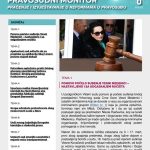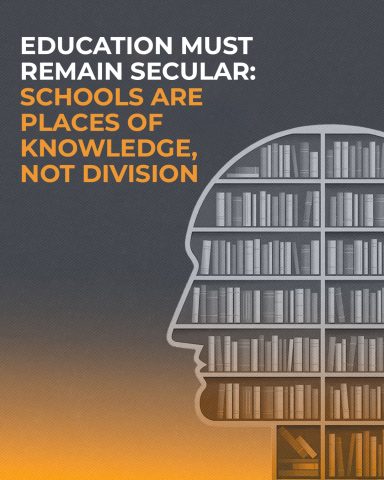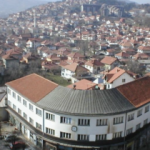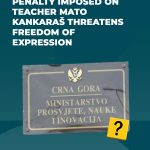
Number 6: Judicial Monitor – Monitoring and Reporting on Judicial Reforms
11/04/2025EDUCATION MUST REMAIN SECULAR: SCHOOLS ARE PLACES OF KNOWLEDGE, NOT DIVISION

Civil society organizations strongly oppose the initiative to introduce religious education into the education system of Montenegro, considering such a proposal to be contrary to the principles of secularism (religious neutrality of public institutions), fundamental constitutional values, and the best interests of children and youth.
We believe that the education system must remain a space for unity, learning, and development—not for division and segregation based on religion.
Religious instruction is explicitly prohibited in public educational institutions in Montenegro (Article 5 of the General Law on Education), and this initiative now seeks to abolish that ban and introduce religious education in primary and secondary schools.
According to the Constitution of Montenegro and the applicable laws on education, Montenegro is a secular state, in which religious communities are separated from the state. Accordingly, the national education system must also remain secular.
It must be taken into account that public schools teach subjects based on scientific disciplines. Science gains knowledge through research, which encourages skepticism, constant revision, and openness to improvement and better evidence. Religious teachings, on the other hand, are based on dogma, are indisputable, do not allow doubt, and insist on faith. We believe that in a comprehensive system of children’s education, it is unacceptable to include elements based on mutually opposing approaches.
Civic education, which includes critical thinking, ethics, media literacy, inclusion, and nonviolent communication skills, is much more beneficial for children and youth. These topics should be enhanced and expanded through curriculum reform, rather than introducing religious dogma.
We are especially concerned that the Parliament of Montenegro has given this initiative priority status, despite negative views from the expert public, some institutions, and civil society organizations, and the fact that there is neither professional nor social justification for its consideration.
When the Parliament of Montenegro introduced the E-petition mechanism in 2023, it was a positive step toward greater citizen participation in decision-making processes. However, there was no legal provision requiring the Parliament to act on petitions that receive the necessary number of signatures—6,000 or more. In practice, this means that the Parliament has the right to reject any petition it does not consider a priority, which we have already witnessed, as only four out of seven such petitions have been discussed by the competent parliamentary committees.
The petition to introduce religious education in schools, launched on 11 March f this year, reached the required number of signatures by 19 March. The Parliament scheduled a session of the Committee on Education, Science, Culture, and Sports for 16 April, thereby breaking its own record for the speed of action regarding received petitions. This set a precedent, as the Parliament decided to consider a still-open petition before the signature collection deadline of 10 May 2025, as stated on the E-petition website of the Parliament of Montenegro.
The Minister of Education, Science, and Innovation, Anđela Jakšić-Stojanović, from the ruling party Europe Now Movement (PES), believes that religious education is not necessary in the education system. Her predecessor, Miomir Vojinović from the also-ruling Socialist People’s Party (SNP), held the same view. However, for the Chairman of the relevant parliamentary committee, Nikola Rovčanin (Democrats), this issue has now become a priority.
Previously, the Bureau for Education also stated that religion is already appropriately addressed in the education system, as children have the opportunity to learn about religion through the elective subject History of Religion, which is available in the ninth grade of primary school and in secondary schools.
Through the History of Religion course, all children have the opportunity to learn together about all religions and their customs, thus fostering interculturalism and unity. In contrast, religious education would separate religious from non-religious children and further divide children of different faiths, emphasizing ethnic and religious divisions that are already present in Montenegrin society.
For families who want religious education for their children, religious communities already organize religious classes in their own premises.
The education system must remain a place where children are not divided on any basis, but rather learn, grow, and develop together, building the skills needed for life in a democratic society that is ethnically, culturally, and religiously diverse.
Civil society organizations supporting this protest:
1. Human Rights Action (HRA)
2. Centre for Civic Education (CCE)
3. Centre for Women’s and Peace Education ANIMA
4. Educational Community of Montenegro
5. Agora Femina
6. Association SPEKTRA
7. Centre for Investigative Journalism (CIN-CG)
8. Montenegrin PEN Centre
9. Montenegrin LGBTIQ Association Queer Montenegro
10. Faculty for Montenegrin Language and Literature (FCJK)
11. KOD
12. Yellow Turtle – Normalize.me
13. Municipal MS Association of Bijelo Polje
14. Association of Youth with Disabilities of Montenegro (UMHCG)
15. Prima
16. Juventas
17. Agency for Local Democracy
18. Ipso Facto
19. Centre for Democracy and Human Rights (CEDEM)
20. Association of Montenegrin Publishers
21. Environmental Movement Ecopatriotism
22. Centre for Monitoring and Research (CeMI)
23. Centre for Affirmation of the Roma and Egyptian Population (CAREP)
24. Montenegrin Women’s Lobby
25. Centre for Democratic Transition (CDT)
26. Centre for Civil Liberties (CEGAS)
27. Association of Lawyers of Montenegro
28. Centre for the Development of NGOs (CRNVO)
29. Sociological Centre of Montenegro (SOCEN)
30. LINK – Montenegrin Harm Reduction Network
31. Centre for Bihor Culture
32. Association “Štrpci – Against Oblivion”
33. Gradionica
34. Expeditio
35. Empty Space
36. Montenegrin Committee of Lawyers for Human Rights
37. Women’s Rights Centre (WRC)
38. Korifej Theatre
39. Kalem
40. Monte Lingva
41. Association of Professional Journalists of Montenegro (DPNCG)
42. Association of History Professors of Montenegro – HIPMONT
43. Safe Women’s House (Shelter)
44. Montenegrin Media Institute (MMI)
45. Legal Representative
46. Antifascists of Cetinje
47. Institute for Gender Equality “Dulcinea”
48. Ulcinj Info
49. New Horizon
50. HUSEIN PAŠA
51. Centre for Multimedia Production (CEZAM)
52. Association of Psychologists of Montenegro
53. Women’s Excellence Workshop – Sofija
54. Active Zone
55. Dr. Martin Schneider-Jacoby Association – MSJA
56. Eduko Plus
57. Balkan Sector
58. Bona Fide Pljevlja
59. Alliance for Children and Youth – Kuća
60. Forum MNE
61. Bosniak Forum of Montenegro
62. Centre for Economic and European Studies (CEES)
63. ERA – Alliance for LGBTI Equal Rights in the Western Balkans and Turkey
64. SOS Rožaje
65. Centre for Training and Education
66. Centre for Roma Initiatives
67. Monitoring Group Ulcinj – MogUL
68. ALFA Centre
69. Association of LBTQ Women “Stana”
70. Children of Montenegro
71. Montenegrin Association of Political Science Students – MAPSS
72. Roma Youth Organization “Walk with Us – Phiren Amenca”
73. Alumni Academy of the Faculty of Law, University of Montenegro
74. Foundation for the Promotion of Science – Prona
75. Montenegrin Cultural Circle
76. Our Action
77. NOVA Centre for Feminist Culture
78. Bridge of Culture
79. SOS Hotline for Women and Children Nikšić
80. My Chance Is Your Chance Too
81. Heart
82. Multimedial Montenegro
83. Social Justice
84. Association of Parents of Children and Youth with Disabilities “OAZA”
85. 35 mm
86. Need
87. Civic Initiative “May 21st”
88. Plan B
89. International Police Organization of Montenegro
90. System
1. Dina Bajramspahić, civic activist
2. Jovana Marović, civic activist
3. Goran Đurović, civic activist
4. Dragoljub Vuković, journalist and civic activist
5. Tamara Milaš, civic activist
6. Dušan Pajović, civic activist
7. Aleksandar Dragićević, civic activist







 English
English